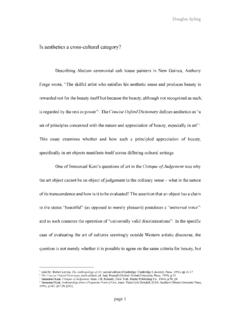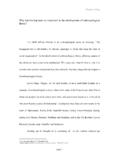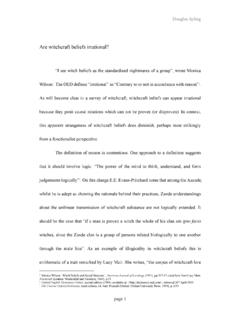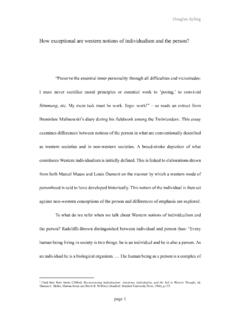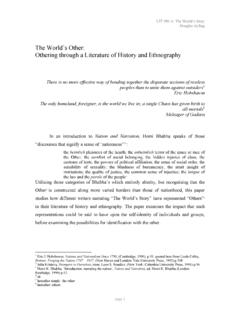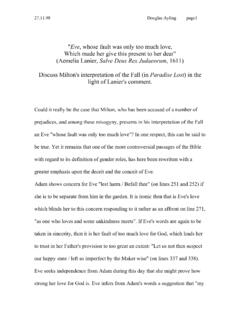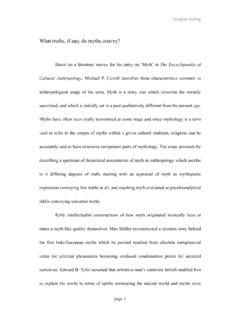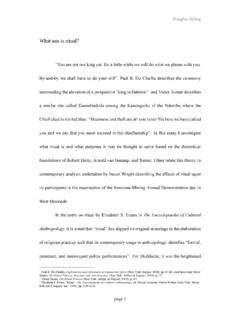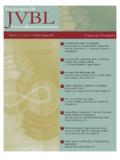Transcription of Copy of ENGTHEAT - Ayling
1 A y l i n g page 1 "Again and again in Shakespeare we are tantalised by the possibility of an escape from theatricality and the constant pressure of power, but we are, after all, in the theatre, and our pleasure depends upon the fact that there is no escape, and our applause ratifies the triumph of our confinement" (Stephen Greenblatt). Consider the implications of this remark for our enjoyment of Shakespearean drama. Stephen Greenblatt's remark implies that "theatricality" and "the constant pressure of power" are linked. I will examine how power uses theatricality to confine us and ask why we applaud this. I take theatricality to mean the artifice of "manner, speech [and] gesture" which is, in the words of the Concise Oxford Dictionary "calculated for effect"1. Theatricality is ritualised in theatre, and for this reason I closely associate the two in exploring the relationships firstly between theatricality and power, and consequently between confinement and enjoyment.
2 Power and theatricality go hand in hand. As Stephen Greenblatt also wrote - of the Renaissance, "Theatricality is one of power's essential modes"2. Power maintains a fa ade because any position of responsibility within an organisation or state or justice mechanism, requires that the individual makes the pretence of shedding their personal interests to represent a higher purpose, to embody the institution. Immediately, the voice is not their own - the Crown the wig and the dog-collar mask the individual and thus in the words of King Lear even "a dog's obeyed in office"3. It is this charade of personal disinterest which is undermined by King Lear's attempt to use his office to obtain what he selfishly desires - his daughters' love: "Which of you shall we say doth love us most? / That we our largest bounty 1 1 The Concise Oxford Dictionary; J. B. Sykes; seventh edition; (UK; Clarendon Press; 1982); p1109.
3 2 2 Quoted here from Richard Wilson; Will Power; first edition; (UK; Harvester Wheatsheaf; 1993); p54. A y l i n g page 2 may extend"4. In contrast, when Prospero refrains from his urge to seek revenge by redefining for himself nobler ends, "the rarer action is in virtue than in vengeance"5, his position is morally strengthened. He becomes a force of justice, and thereby justifies his seemingly egotistical machinations - ordering the storm, terrorising Antonio and the shipwrecked crew. The fa ade of propriety is inversely created by Henry IV, who hopes to break through an image of dissipation "like bright metal on a sullen ground, / My reformation glitt'ring o'er my fault"6; and when he prematurely seizes the crown, he must swiftly disclaim power-lust: "But if it did infect my blood with joy / .. Let God for ever keep it from my head"7. By the same token, Julius Caesar publicly refuses the crown three times, before a scrutinising audience, and the usurpers are instructed by Brutus to "Let not our looks put on our purposes; / But bear it as our Roman actors do"8.
4 But a fa ade is not enough. Whereas Portia as Balthasar, Viola as Cesario, and Rosalind as Ganymede, can wear the doublet and hose and thereby gain entrance to the male world of authority, their power derives from their ability to enounce. Their speech forces itself upon those around them, they derive power from the ability to sustain encapturing expression. Their theatricality, their artifice is that of playing to the gallery as opposed to talking to the person they address. For Anthony to regain influence in Rome, he must gather the crowd around him - "make a ring about the corpse of Caesar"9 he instructs - creating a theatre in the round. We have been tantalised by the possibility of an escape from theatricality by the 3 3IV.
5 Vi. 152; The Norton Shakespeare; first edition; Stephen Greenblatt; (USA; W. W. Norton 1997) p2537. 4 4I. i. 49-50; The Norton Shakespeare; first edition; Stephen Greenblatt; (USA; W. W. Norton & Company; 1997) p2480. Hereafter all Shakespearean quotations will be referenced to page numbers from this source. 5 5 V. i. 27-28; p3098. 6 61 Henry IV; I. iii. 190-191; p1164. 7 72 Henry IV; IV. iii. 297 and 302; p1362. 8 8II. i. 224-225; p1550. 9 9 III. ii. 155; p1567. A y l i n g page 3 honesty of his tears, but in his formation of the round, he consciously puts himself centre stage and uses Caesar's body as a prop to move the audience's passions. Theatricality relies in essence upon a consciousness of the audience's gaze, and it is this consciousness which confers a power upon the observed to manipulate their sympathies. Bolingbroke is a "well-graced actor"10 because he times his entrance to reap the popular gaze.
6 He orchestrates the scene, he creates a spectacle - in the same way that the priest's breaking of the bread during mass confirms his power through performance. Paulina in The Winter's Tale therefore gains power by delivering a show: "Music; awake her; strike!"11 she directs, conducting the ceremony of Hermione's transubstantiation. In absorbing the interest of a crowd, the performer subjectifies his audience. To watch is to be passive. Therefore while theatricality can derive power by raising crowds, the full expression of theatricality in theatre can subdue and sedate. In her essay 'Government and Spectacle', Janice Carlisle observes that in The Times newspaper reviews of 1879, the reviewers seem preoccupied with the response of the "lower orders" to each play. Carlisle remarks "more than half of these notices begin with comments that prove that the most unruly elements of the audience are tamed by the performances they see"12.
7 Where it does not advance the main plot of the narrative, the play within the play in Shakespeare's works can be seen as a means of deferral. Both in The Tempest and in A Midsummer Night's Dream, Prospero and Theseus respectively, use performance to defer the time when the lovers will go to bed. Theseus is realising his original intention to "wed thee in another key"13 and the play 10 10 Richard II; V. ii. 24; p1003. 11 11V. iii. 98; p2951. 12 12 Janice Carlisle; 'Spectacle as Government'; The Performance of Power; Sue-Ellen Case and Janelle Reinelt; first edition; (USA; University of Iowa Press; 1991); p172. 13 13I. i. 18; p815. A y l i n g page 4 acts as mood music, which like the "noises / Sounds and sweet airs"14 of Caliban's isle are "voices / That if I than had waked after a long sleep / Will make me sleep again"15. We become lulled to stillness by theatre, tamed like Christopher Sly in The Taming of the Shrew, who sits at the side of the stage as the play absorbs him.
8 By inverting the assumed order of who is watching who, power is able to use theatricality subjectify the audience. Dickens admiringly noticed of the Britannia Theatre, that "the whole [was] so admirable raked and turned to the centre, that a hand could scarcely move in the great assemblage without being seen from thence"16. Thus, Carlisle draws the analogy between the theatre and the Foucaultian-Benthamite panopticon: "The person on stage is not the object of the audience's gaze, but the overseer of the audience as spectacle"17. The implication is that the environment of the theatre conditions us as subjects, in accordance with Foucault's explanation that a panopticon "induce[s] in the inmate a state of consciousness and permanent visibility that assures the automatic functioning of power"18. Carlisle therefore upholds that an audience "polices itself, ejecting any disorderly "man or boy""19. Richard Wilson describes Prospero's circle - in which his "spell-stopped"20 captives stand confined - as another embodiment of the panopticon21.
9 This theatrical round is made of "docile bodies"22 unsure as to whether they are being watched. Thus, although Prospero's 14 14 The Tempest; III. ii. 130-131; p3087 15 15 Ibid.; lines 134-5. 16 16 Quoted here from Janice Carlisle; 'Spectacle as Government'; The Performance of Power; (USA; University of Iowa Press; 1991); p167. 17 17 Ibid. 18 18 Foucault, Michel; 'Discipline and Punish'; Literary Theory: An Anthology; first edition; Julie Rivkin, Michael Ryan; (GB; Blackwell Publishers Ltd.; 1998); p470. 19 19 Janice Carlisle; 'Spectacle as Government'; The Performance of Power; (USA; University of Iowa Press; 1991); p167. 20 20V. i. 61; p3099. 21 21 Richard Wilson; Will Power; first edition; (UK; Harvester Wheatsheaf; 1993); p153. 22 22 Ibid.; p154. A y l i n g page 5 abrupt interruption of the masque "Well done!
10 Avoid; no more!"23 seems to herald a release from his theatrical domination, the intrusion of the shipwrecked wrong-doers on to his stage is just as orchestrated as the masque which preceded it. Even as we are tantalised by the prospect of Prospero relinquishing this all-containing magical power "I'll break my staff, / Bury it certain fathoms in the earth"24, we have - like the prisoners - already become internally subjectified, and we carry this confinement within us. Power inculcates self-surveillance through theatricality and as Wilson writes, "if Ariel vanishes into air, it is because surveillance of our crimes is now undertaken by ourselves, the judges of normality who are present everywhere"25. We ratify this shift into a surveillance culture by our forced applause. If we do not applaud, Shakespeare's stage directions threaten that Prospero will remain on the central stage of the panopticon until we have internalised - or given "indulgence"26 to - his confinement.

